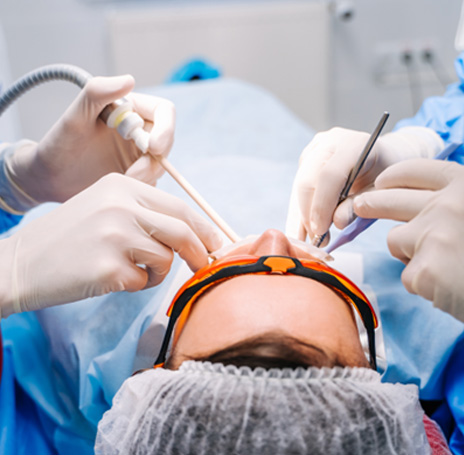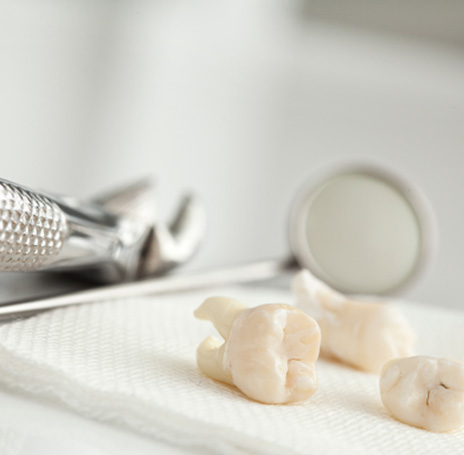Wisdom Tooth Extractions – Rock Hill, SC
Remove Troublesome Wisdom Teeth to Protect Your Smile

Wisdom teeth are notorious for causing issues when they try to erupt through your gumline. Often, the best course of action is to extract them before they cause problems that get progressively worse over time. Thankfully, our team at Ross & Sourlis Family Dentistry of Rock Hill can remove troublesome wisdom teeth to protect your smile.
Continue reading to learn more about what to expect from this procedure, and feel free to contact us with any additional questions.
Why Choose Ross & Sourlis Family Dentistry of Rock Hill for Wisdom Tooth Extractions?
- Advanced Technology for Enhanced Patient Comfort
- Multiple Types of Sedation
- Flexible Financing and In-House Memberships Available
What are Wisdom Teeth?

It’s believed that ancient people developed wisdom teeth to replace any molars injured or lost in their youth. Our ancestors ate a rough diet of leaves, berries, nuts, and chewy meats that would wear down or damage their teeth and likely needed additional molars as they got older.
Most people have four of these late arrivals, but others have only a few, and some lucky folks are born with none. They try to push through behind your farthest molars, usually between 17 and 25 years old. Today, they’re often removed because they’re considered a vestigial feature. They may once have fulfilled an important function, but they’re no longer necessary for our survival and tend to cause problems.
Why Do Wisdom Teeth Need to Be Removed?

Having wisdom teeth removed is such a common procedure that many consider it a rite of passage for teens as they enter adulthood. This is because they can cause one or several issues that can harm your overall oral condition, such as:
- Severe discomfort. You’ll likely have tooth, jaw, and headaches as they struggle to clear your gumline.
- Overcrowding. They frequently push neighboring teeth out of alignment, which can unevenly wear down your enamel and leave you more vulnerable to breakage.
- If they grow in at an inappropriate angle, they can become caught in your jaw and become infected.
- A painful, fluid-filled sac can form around an impacted tooth in your jawbone.
- Dental problems. Teeth that are partially covered are difficult to brush and floss, increasing the likelihood of developing tooth decay or gum disease.
What to Expect from the Wisdom Teeth Procedure

If you’re concerned that your wisdom tooth procedure will be long and agonizing, our team is here to set your mind at ease! If your molar has fully cleared your gums, you may only require a simple extraction. For this procedure, we’ll apply a local anesthetic and/or sedate you so that you remain calm and relaxed the entire time. Then, we’ll use a device called an “elevator” to gently lift your tooth in the socket so it’s easier to access. Finally, one of our providers will grasp the tooth gently with forceps to wiggle it free.
However, if your wisdom teeth are impacted or infected, you’ll likely need a surgical extraction. We’ll ensure that you’re numbed and sedated first, then we’ll create a small incision in your gums to access the tooth. Sometimes, we may need to break it into smaller sections that can be removed without damaging your jawbone.
Recovering from Wisdom Teeth Extraction

It’s natural to wonder what to expect once your wisdom teeth are successfully removed. Many after-care instructions are intended to preserve the blood clot that must form over the site to protect the now-exposed nerves and bone tissue. Without it, you could develop a painful complication known as dry socket.
Some typical post-op orders include:
- Rinse with warm salt water instead of brushing and flossing for the first 24 hours. Usually, it’s safe to resume your usual routine after a day or two, but be careful around the extraction site.
- Drink plenty of water, but don’t use a straw. The force of the suction could dislodge your blood clot.
- Watch what you eat. Stick to soft foods that won’t worsen any discomfort, like scrambled eggs, mashed potatoes, yogurt, pudding, and apple sauce.
- Take prescribed medications. If you were given an Rx for antibiotics or pain meds, take them exactly as directed. Otherwise, it’s usually safe to take ibuprofen or Tylenol for any residual aching.
If you have pain that persists or gets worse after 3 days, please contact us and let us know so we can ensure that your mouth recovers as intended.

